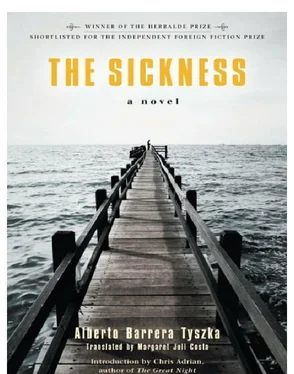There was no alternative. Andrés had to sit down and tell him straight: yes, the blood tests were fine, but he wanted to be absolutely sure, that’s why he thought his father should have a couple of X-rays and an MRI scan. It was part of a general examination, a routine exercise, simply to confirm that everything was alright.
“Trust me,” he said. “Believe me.”
His father sighed deeply and only then agreed to be taken to the hospital’s radiology unit.
His father comes out into the corridor and eyes him gloomily. His naked body is covered only by one of those skimpy gowns that tie at the back. Andrés almost runs over to him.
“There, that wasn’t so bad, was it?”
His father doesn’t answer. He doesn’t even look at him now. He could at least grunt a response.
“Now there’s just the MRI and the CT scan,” murmurs Andrés, about to propel his father down the corridor.
His father complies, still without looking at him.
“When someone faints,” Andrés explains again, “there has to be a motive, a reason, a cause. That’s what medicine is for. If the blood tests don’t give me an answer, then I have to try something else. That’s all. That’s all it is. A matter of searching for answers.”
“He who seeks, finds,” his father mutters reproachfully and continues on down the corridor, still refusing to look at him.
Dear Dr. Miranda,
Did my e-mail not reach you? I’m a bit of a novice on the Internet, perhaps I pressed the wrong button. I’ve been thinking about this while I’ve been waiting. I keep checking my inbox to see if there’s a message from you, but there never is.
Meanwhile, I haven’t even attempted to phone you. The last time, your secretary told me that those were your instructions, that you yourself had told her not to put me through, that you had even asked hospital security not to let me in if I should show my face there. I don’t believe it, I said. I can’t believe it. And she hung up. I haven’t phoned since. But I’m still worried, Doctor, I don’t understand what’s going on. There’s no logical explanation for all this. That’s why I persist, that’s why it’s so important that I write you another letter, that’s why it’s so important that you should answer.
It also occurred to me that perhaps you don’t remember me. Is that the reason? It seems rather odd, but then again it might explain why you haven’t yet responded. Or perhaps you’re confusing me with someone else. That’s another possibility. I’ve spent the last few days going over and over all this in my mind. You probably don’t remember most of the people who pass through your office. How many patients do you see a day? Seven, eight, ten, twelve? Possibly more. Multiplied by the five days of the week, of course. That’s a lot of people. You probably think no one could remember that many people. But I’m sure no one forgets you. For us, you’re the doctor. Our doctor. My doctor. For you, we’re just patients in general, anonymous beings, your patients, people who wait to be seen. The word says it all — patients — people who are patient. For us, on the other hand, you have a first and a last name. You’re Dr. Andrés Miranda. You’re unique.
I’m worried now that you’ll take what I’ve just written the wrong way. I hope not. I’m only saying all this because it has to do with my relationship with you. If I may, I’m going to remind you of our first meeting. I found out about you while I was visiting another doctor, in one of those medical journals you get in waiting rooms. I read an article you’d written about the relationship between doctors and patients. You said, and I’m sure you’ll remember this, that it was part of the treatment, that the relationship between doctor and patient could contribute to the healing process. You said that we shouldn’t speak of illness but of ill people. That illness, in general terms, did not exist. That only individual people, ill people, existed, and that the relationship between doctor and patient should be a personal as well as a medical one.
That idea made such an impact on me that I immediately looked you up so that I could come and see you, so that you could be my doctor. I told you all this during our first appointment. And you listened to me very attentively. At least that’s how it felt. I felt that you were really listening to me. We talked about my job at the telephone company. We talked about my life, my family, my parents, my brothers and sisters. I told you about my divorce, about how badly I got on with my ex-wife, and still do. Then we moved on to the physical symptoms. You were very attentive about those too. I felt you were listening to me with genuine and profound interest, with respect. I tried to explain in detail what was going on. Since I don’t know whether you remember or not, I feel I should repeat it all here. If you don’t mind, it’s your turn to be patient.
For some time, I’ve been experiencing sudden drops in blood pressure, an internal imbalance which means that, on a daily basis, I frequently feel as if I were on the verge of fainting. The symptoms are quite clear: cold sweats, pallor, a feeling of inner weakness, a decrease in body temperature, and, of course, the slight dizziness anyone experiences before a fainting fit. I told you all this. And you noted everything down. You asked a few questions. Then you checked me over, took my blood pressure, “120 over 80,” you said, adding: “Very good.” Then I mentioned the article I’d read and told you that was the reason I’d come to see you. You just smiled. I swear to you I felt sure I’d finally found a doctor I could trust.
At our next appointment, and you’re bound to remember this, I arrived with the results of the tests you’d advised me to have done. A complete blood count and a lipid profile. You were just as friendly as you were the first time. We even joked a little, talking about my ex-wife, about women and ex-wives in general. I felt we were making some progress in our relationship. You told me that you were married and had two children. I told you that, fortunately, I hadn’t had any children during my failed marriage. Anyway, then we got down to medical matters. You said that the test results were excellent and that I was fine. That was impossible, I told you. I was still getting the dizzy spells. Perhaps you didn’t like me being so insistent. But I had to do it. I was the one who was going to faint, not you. In fact, I said just that. Then you assured me that I was in perfect health. That I wasn’t going to faint. That it was a physical impossibility. On that occasion, you asked me to believe you, to trust you. And I did, Dr. Miranda. Now I’m the one asking the same thing of you: believe me, have faith in me, trust me. . please, answer me!
Hoping to hear from you soon.
Sincerely,
Ernesto Durán
When Miguel arrives, Andrés is already sitting at a table slightly apart from the other tables, drinking his second whisky and ice. Miguel looks harassed and preoccupied.
“Sorry I’m late,” he says as he sits down.
Andrés merely makes a vague movement with his head, neither a nod nor a shake, as if hoping, nonetheless, to communicate something by that gesture. His face almost breathes unease and distress.
“On the phone you said it was something serious,” says Miguel, “but now that I see your face, I feel quite frightened. Whatever’s happened?”
Andrés points to the two envelopes on the table.
“Have a look at those,” he says, almost in a murmur.
Miguel picks up one envelope, takes out the X-rays, and holds them up to the light. First, those showing the lungs, then the images from the brain scans.
Читать дальше












